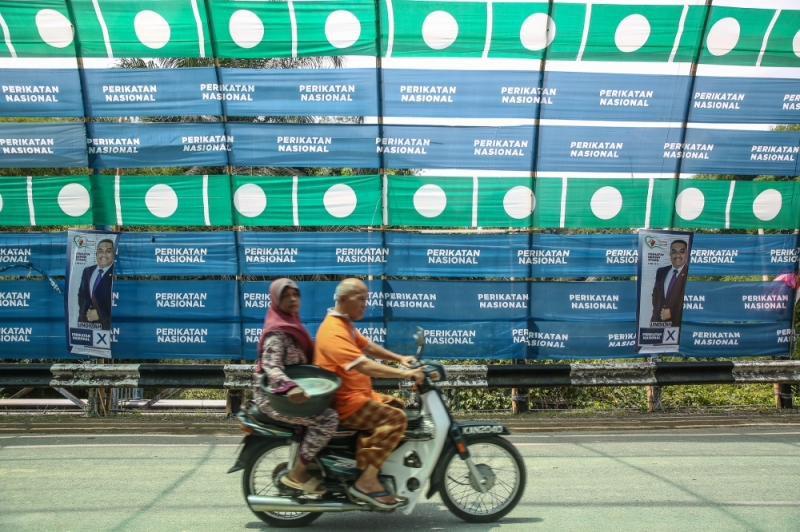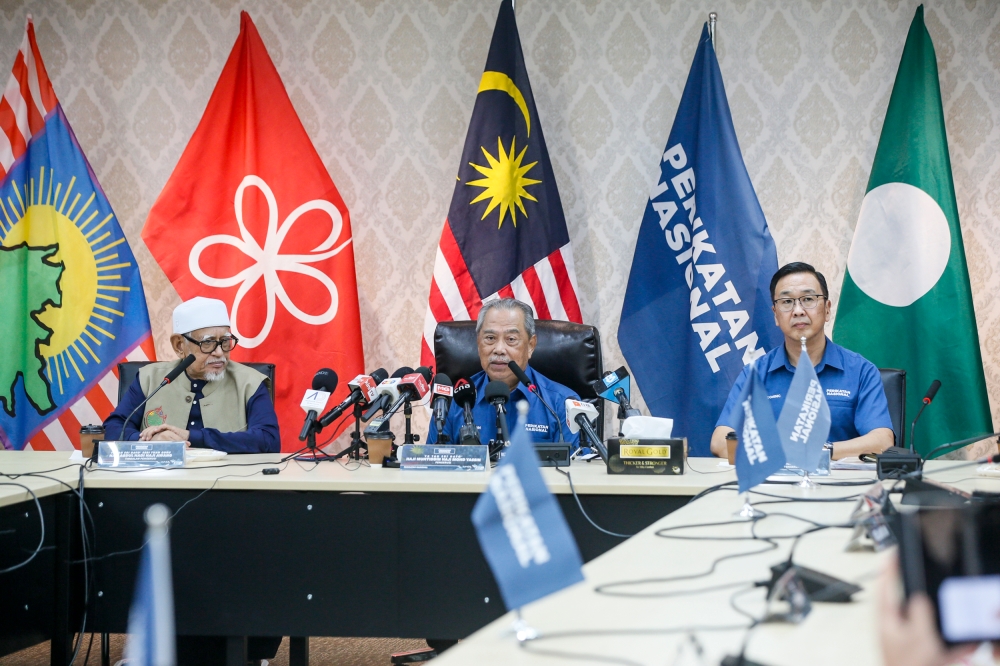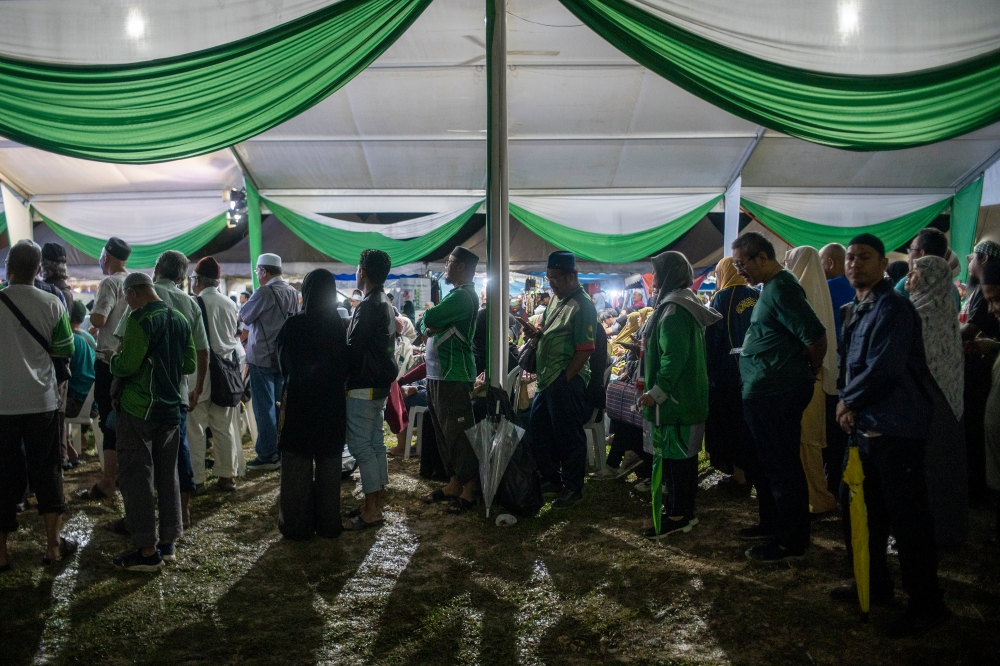A symptom of Malaysians’ online silos, study sees ‘green wave’ propaganda building towards critical mass

The dark horse of the election, the coalition comprising Bersatu, PAS, and Gerakan was only foiled when Pakatan Harapan and Barisan Nasional brokered an unlikely alliance that saw other parties subscribing to what eventually became the national unity government. — Picture by Yusof Mat Isa
Saturday, 18 Nov 2023 7:00 AM MYT
KUALA LUMPUR, Nov 18 — Malaysians’ heavy reliance on social media for their news consumption have exposed them to the political misinformation and hate propaganda that fuelled the “green wave” of support for Perikatan Nasional (PN) in last year’s general election, according to two researchers examining the phenomenon.
In a piece titled “Social Media and the Manufacturing of Malay-Muslim Insecurity” published on the stratsea website, researchers Hew Wai Weng and Nicholas Chan cited a report that nearly three in four Malaysian Internet users relied on social media as their main source of news.
Hew is a research fellow at the Institute of Malaysian and International Studies (Universiti Kebangsaan Malaysia) while Chan is a postdoctoral fellow at the Strategic Defence & Studies Centre from the Australian National University.
“Hence, social media necessarily becomes the primary medium where sequestered Malaysian voters experience politics. That means they also experience the wave of hate propaganda, half-truths and downright misinformation that comes with it.
“There is no understanding of the green wave without an honest reckoning of these elements,” they said.
In last year’s 15th general election, PN initially claimed victory after no single party emerged the clear winner in the fiercely contested poll.
The dark horse of the election, the coalition comprising Bersatu, PAS, and Gerakan was only foiled when Pakatan Harapan and Barisan Nasional brokered an unlikely alliance that saw other parties subscribing to what eventually became the national unity government.

PN chairman Tan Sri Muhyiddin Yassin, PAS president Tan Sri Abdul Hadi Awang and Gerakan president Datuk Dominic Lau during a press conference at Perikatan Nasional headquarters in Publika, June 22, 2023. — Picture by Hari Anggara
However, the so-called “green wave” of support for religious conservatism still allowed Islamist party PAS to become the single best represented party in Parliament, taking over the mantle that had once been worn by the dominant Umno.
In post-mortem examinations of GE15, it was shown that PN had tapped into the pulse of nation through its deft use of social media — particularly TikTok — to amplify its communal politics and overcome shortcomings at the grassroots level, leapfrogging rivals that were still campaigning traditionally.
Worryingly, however, it also emerged that there had been paid campaigns to incite unrest based on the racial riots from May 13, 1969.
According to Hew and Chan, the phenomenon was not unique to Malaysia, and was effectively a “common right-wing playbook” also being deployed in the US, India, and Brazil where the strategy was to “wrap the anti-liberal, anti-minority and anti-establishment discourse as one, with the moral critique appealing more to conservative middle-class religiosity.”
Such messaging was particularly effective among the masses as it appealed to groups that saw themselves as being marginalised in their “own country,” they added.
“Therefore, it is useful to think of Malaysia’s green wave as more of a kind of majoritarianism: majoritarian groups urging the majority to vote and support the parties that could protect the majority.

People attend during the Pidato 4 Menteri Besar in conjunction of Muktamar PAS in Shah Alam on October 20, 2023. — Picture by Shafwan Zaidon
“To make this political ‘movement’ work, efforts to manufacture Malay-Muslim insecurity must first bear fruit. Such is evident in right-wing online activism in recent time,” they continued.
Hew and Chan cited the controversy that pro-PN influencers, right-wing preachers, and activists fomented over the Youth and Sports Ministry’s abortive “Jom Ziarah” programme to inculcate interfaith understanding, saying the coordinated messaging exposed the nexus between right-wing political influencers and mainstream PN politicians.
The two researchers also cautioned against viewing the “green wave” as a recent or novel phenomenon, arguing that it was rooted in the 2018 general election that ended Barisan Nasional’s over six decades of unbroken rule in the country and broke Umno’s hold on Malay politics.
It was also evidence of once “fringe theories” and right-wing voices achieving critical mass that — along with silos formed by social media algorithms — would continue building on wave upon wave of “anti-minority” sentiment, they said.
“With hate speech and misinformation mainstreamed at such volume, efforts aimed at preserving free speech without regulation and ‘fact-checking’ without proactive measures seem increasingly out-of-sync with present challenges.”
The conclusion appeared to be supported by the results of the six state elections in August, when the “green wave” allowed PN to make further inroads into Selangor, Negeri Sembilan, and Penang while nearly shutting out its rivals in Kedah, Kelantan, and Terengganu.
Pro-Palestine is being harnessed into Pro-PAS.
ReplyDeleteAnti-Israel is being harnessed into anti-DAP.
THE TSUNAMI IS UNSTOPPABLE.